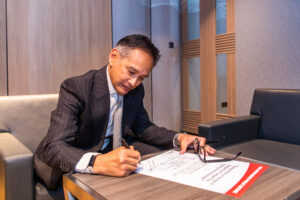Abstract
The age of intensified geopolitical competition – not that it has completely gone away – is well before us. Tectonic geopolitical shifts and tremor manifest in the almost incessant tensions and disputes between so-called major powers: the United States, China, Russia and their respective allies as well as partners. Geopolitical dynamics infuse areas beyond the traditional security domain. Precisely at a time when issues emerge that defy national solutions alone and demand multilateral cooperation – social and development, climate and health issues for instance – geopolitical divide and faultline stifle common action. Management of the global commons are being “weaponized”. Diplomacy as preferred statecraft faces headwinds. Efforts at peace are hushed by war drums.
And not least, large number of countries, not aligned to any of the contending geopolitical rivals, are being tasked to choose: “are you with us or against us?”
A critical juncture beckons. In response to the then raging Cold War between East and West, the great majority of states, representing a significant portion of humanity, responded by pursuing a non-aligned or independent foreign policies. The Non-Aligned Movement and the Group of 77 are perhaps the clearest, though not exclusive, illustrations. Examples at the national level abound. Indonesia, for instance, have long described itself as pursuing an “independent and active” (bebas dan aktif) foreign policy.
Today, similar concerted and cohesive response to the deepening geopolitical divide are lacking. The so-called “Global South” are being defined and identified primarily by, and from, the prism of the contending geopolitical rivals. Countries and regional groupings are inclined to limit themselves to exhortations for the geopolitical rivals to exercise restraint, and not to be forced to choose. A sense of drift, irrelevance and helplessness permeate. At the conceptual level, there is a dearth of alternative paradigms and perspectives to the well-known and traditional notion of power and security which have been recipe for instability, deepening trust-deficit among nations and heightened risk for miscalculation.
How can the great majority of states – outside the well-defined geopolitical rivals – make themselves heard and, more significantly, make positive contributions independent of the well-defined geopolitical rivals seemingly bent on achieving preponderance over the other irrespective of the costs to the global community of nations?
About the Speaker
Marty Natalegawa was appointed as Distinguished Visiting Fellow in the S. Rajaratnam School of International Studies on 1 July 2022.
Dr Natalegawa holds a D.Phil. from the Australian National University; an M.Phil. from University of Cambridge; and a BSc (Hons) from the London School of Economics.
Dr Natalegawa served as Foreign Minister of Indonesia (2009 – 2014). Previously, he served as Permanent Representative/Ambassador of Indonesia to the United Nations (UN); Ambassador to the UK and also to Ireland. Within the Ministry of Foreign Affairs of Indonesia, among others, he served as Director General for ASEAN Cooperation and Director for International Organizations.
Within ASEAN, he has been instrumental in pushing for the ASEAN Community and was an early advocate of an ASEAN role in the Indo-Pacific through the concept of “dynamic equilibrium”. Throughout, including as Foreign Minister, he actively promoted the management and resolution of potential conflicts in the region.
Within the context of the UN, he served, among others, as President of the Security Council in November 2007 and led Indonesia’s delegation at numerous multilateral negotiations, both within the UN and beyond. He was instrumental in securing Indonesia’s ratification of the Comprehensive Nuclear Test Ban Treaty (CTBT) in 2012.
He served in the UNSG’s High Level Panel on Global Response to Health Crises and UN President of the General Assembly’s 72nd Session Team of External Advisors.
He is a member of the UN Secretary-General’s High Level Advisory Board on Mediation. He is also a member of the UN Secretary-General’s Advisory Board on Disarmament and the Board of Trustees of the United Nations Institute for Disarmament Research.
He is also presently Asia Society Policy Institute Distinguished Fellow; a member of the International Academic Advisory Committee of the Oxford Centre for Islamic Studies; the Southeast Asia Advisory Board of the Centre for Strategic and International Studies (CSIS – Washington, D.C.); Global Advisory Committee of the Jeju Forum; University of Western Australia’s Public Policy Institute Advisory Board; the Board of Directors of the Global Centre for Pluralism, Ottawa; and is a Prominent Research Scholar of the Bank of Indonesia Institute. He is also the Chairperson of the Asia Pacific Leaders Network (APLN) for nuclear non-proliferation and disarmament.
He is the author of “Does ASEAN Matter? A view from Within” (ISEAS Publishing – 2018).
Dr Natalegawa has been cited as “one of the most respected foreign policy and international security thinkers of his generation, both within Indonesia, in South-east Asia, and in the broader Asia-Pacific region”.



 Add to Google calendar
Add to Google calendar
 Add to Outlook calendar
Add to Outlook calendar


